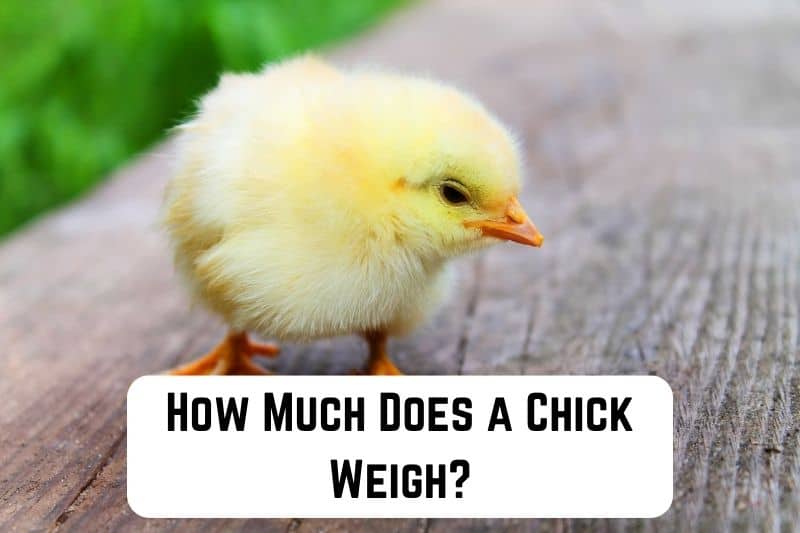Have you ever wondered about the weight of a newly hatched chick? As you embark on your journey of raising chickens or simply out of curiosity, knowing a chick’s weight can be an interesting piece of information.
In this article, we’ll explore the factors that contribute to a chick’s weight and why it is important to be aware of it.
Various factors such as breed, genetics, and even nutrition during the egg-laying stage can influence a chick’s weight. On average, most newly hatched chicks weigh around 30 to 50 grams (1 to 1.5 ounces), with small breeds being on the lighter side, and large breeds leaning towards the heavier end of the spectrum.
Read: How Much Does a Mouse Weigh? (Common Mouse Species)
A day-old chick weighs between 35 to 50 grams (1.2 to 1.7 ounces). Of course, depending on the breed, this weight can vary slightly. Larger breeds like the Jersey Giant may see their chicks weigh about 60 grams (2.1 ounces) at birth.
How Much Does a Chick Weigh?
When you first pick up a newly hatched chick, you’ll appreciate how delicate and light these little creatures feel in your hands. A day-old chick weighs between 35 to 50 grams (1.2 to 1.7 ounces). Of course, depending on the breed, this weight can vary slightly.
For example, larger breeds like the Jersey Giant may see their chicks weigh about 60 grams (2.1 ounces) at birth. On the other hand, smaller breeds like bantam chickens or Seramas begin their life at a mere 20 grams (0.7 ounces).
As chicks grow older, their weight increases, and by two weeks of age, they usually double or even triple their hatch weight.
To ensure your chicks develop properly and stay healthy, monitoring their weight gain throughout their growth is vital. Typically, a chick should gain roughly 10% to 15% of its body weight daily.
You can help manage this process by providing them with a nutritious diet, adequate clean water, and a comfortable environment.

Chick Weight at Birth
Immediately After Hatching
When a chick hatches from its egg, it’s tiny and wet, and you might be curious about its weight. On average, newly hatched chicks weigh around 40 grams (1.4 ounces).
However, they may appear lighter due to the loss of their eggshell. It’s important to remember that chick weight can vary depending on several factors, including the breed and health of the hatchling.
As the chick starts to dry off and fluff up, its downy feathers will give it a slightly larger appearance. Despite this, its weight will be quite stable during the first day or two after hatching. Providing proper warmth & nutrition during this critical period helps ensure healthy growth.
Variations Between Breeds
Just as there are variations in the size and weight of adult chickens, there are also differences in chick weight depending on the breed. Here’s a quick overview of some common breeds and their weight at hatch:
- Bantam chickens: These are the smallest chickens, and their chicks usually weigh only about 28 grams (1 ounce) at hatch.
- Standard or large breed chickens: These larger birds, such as Rhode Island Reds and Plymouth Rocks, produce chicks that weigh between 40 and 48 grams (1.4 to 1.7 ounces) at hatch.
- Heavy breed chickens: Breeds like the Jersey Giant and Orpington have the largest chicks, weighing around 60 grams (2.1 ounces) at hatch.
It’s essential to consider these breed variations when assessing your chicks’ health and growth. Comparing the weight of a Bantam chick to that of a Jersey Giant chick wouldn’t offer helpful insight, as they have different growth expectations based on their breed.
Growth Rate and Factors Influencing It
Feeding
Providing adequate nutrition is crucial for the healthy development of chicks. The type and quality of feed can significantly impact their growth rate. Ensure you offer a balanced diet that fulfills their daily nutritional requirements. Keep in mind the following tips:
- Always use high-quality feed specifically formulated for chicks.
- Maintain a clean feeding area to prevent the risk of contamination and diseases.
- Monitor the feed consumption to ensure the chick maintains a healthy appetite.
Genetics
Genetic factors play a significant role in determining the growth rate of chicks. Selective breeding has resulted in breeds with different growth potentials. When choosing the chicks for your flock, consider the following:
- Choose breeds with a track record of reaching the desired weight within your preferred timeline.
- Obtain chicks from reputable breeders to ensure purebred and high-quality genetic traits.
- Understand the growth characteristics of the specific breed to get an idea of their overall weight gain pattern.
Environmental Conditions
The environment in which chicks are raised directly impacts their growth rate. Maintaining optimal conditions during their development is essential. Here are some key considerations:
- Ensure that the brooding area is kept at an appropriate temperature, which is usually around 95°F (35°C) in the first week, and gradually reducing it by 5°F (3°C) every week thereafter.
- Provide good ventilation in the barn or enclosure, as it helps prevent respiratory issues and maintain optimum humidity levels.
- Adequate lighting plays a role in stimulating feed intake, which ultimately affects growth. Make sure the chicks receive sufficient lighting each day.
By considering these feeding, genetic, and environmental factors, you can ensure the optimal growth rate for your chicks.

Average Weekly Growth Progression
Week One
During the first week, your chick will experience rapid growth. When hatching, a typical chick weighs around 40-45 grams. By the end of the week, you can expect the weight to increase to nearly double, reaching about 80-85 grams. This initial weight gain is mainly due to the development of crucial organs, bones, and muscles.
- Day 1: 40-45 grams
- Day 7: 80-85 grams
Week Two
In the second week, the growth rate might not be as rapid as in week one, but your chick will still gain weight. By the end of this week, the weight can increase to 170-190 grams. During this period, you’ll notice the formation of feathers on the wings and the visible expansion of their body.
- Day 8: 80-85 grams
- Day 14: 170-190 grams
Week Three
The third week will continue weight gain and further feather development. The weight of your chick can reach around 300-340 grams by the end of this week. At this stage, the chick starts to look more like a young chicken with confidence in its movements.
- Day 15: 170-190 grams
- Day 21: 300-340 grams
Week Four
As your chick reaches its fourth week, the growth rate slows down slightly. However, weight gain will continue with a more balanced increase. By the end of week four, the weight of your chick can reach around 500-525 grams. This week also sees the enhancement of feathers and the general body structure.
- Day 22: 300-340 grams
- Day 28: 500-525 grams
Chick Weight vs Hen Weight
When you’re comparing a chick’s weight to that of a hen, you’ll notice some significant differences. Chicks, being newly hatched birds, are understandably much smaller than adult hens. A day-old chick weighs about 40 grams (1.4 ounces). Of course, this weight can vary depending on the breed.
Read: How Much Does a Nickel Weigh? (Facts and Figures)
As chicks grow, they gain weight rapidly. After just 6 weeks, you might find that your chick has grown to weigh around 800 grams (28 ounces). However, it’s important to understand that chicks will continue growing and gaining weight until they reach maturity.
Adult hens, on the other hand, show more variation in weight based on the breed. For example:
- Bantam hens, which are smaller, weigh around 700 grams (25 ounces).
- Medium-sized hens, such as the Plymouth Rock, typically weigh between 3-3.6 kilograms (6.6-8 pounds).
- Large-sized hens, like the Jersey Giant, can reach up to 6 kilograms (13.2 pounds) in weight.
Each breed has unique weight characteristics, so it’s essential to research before making any assumptions.
It’s normal for chicks and hens to fluctuate in weight throughout their lives. Factors like diet, health, and stress can all affect these fluctuations.
Remember, comparing chick and hen weights is like comparing apples and oranges. Although they’re both part of the same species, their age and stage of development significantly impact their weight. So, embrace the growth journey and enjoy watching your chicks transform into beautiful, healthy hens!







